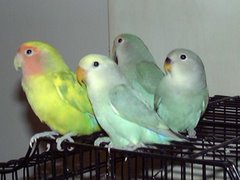General Housing Arrangements of Lovebirds
Before considering the different ways of housing Lovebirds, it is important to remember certain basic requirements. Lovebirds are creatures of the light and fresh air. Therefore their quarters must be light and airy. Dark, damp and stuffy places depress them and they will not thrive there.
Draughts are of course fatal to any living thing and birds are no exception, so positions between, say a door and a window or a chimney should be avoided. Lovebirds may be kept in cages, bird rooms or aviaries. Let us consider each in turn.
Cages
There are many patterns and designs on the market or the handyman can make his own. They included two types, viz., the box pattern and open wire cage
Cage should have following components: -
- Removable basal part
- Removable top
- Removable feeder and waterer
- Removable perches
- Safe toys
- Sufficient artificial light and some indirect sunlight
- Confinement facility near feeder (so as to capture the required bird with ease, using handle with net and smoothened edges, under semi dark conditions)
Cage Design
Cage should provide following basic requirements for Lovebirds-
- Adequate space for exercise
- Adequate “security area” where it can hide from commotion and preying eyes
- Feeding space
- Space to hold water trough
Vertical Cages
A vertical cage is not much appreciable because in such cages climbing alone is possible and neither flight for free movement is difficult.
Horizontal Cages
Horizontal cages possess more merits as quoted below: -
- It provides maximum space for flight
- It provides facilities for jumping from perch to perch
- It provides an easy placement of food containers and waterers
Note: - Bottom tray should be easily removed for cleaning purpose.
Recommended Cage Profile
Minimum cage size- 12 cubic feet (1.11 cubic meter) with 2 inches x 2 inches x 3 inches (60 cm x 60 cm x 60 cm) dimension.
Floor of the cage
Fine sterile sand or floor paper (a kind of sand paper) is best suitable for the floor of the cages. Floor paper is better since it is easy to clean and change the floor covering on daily basis. Cleaning the floor with soap water and drying it before placing a new floor paper is highly advisable to prevent any occurrence of disease.







 Free Ads For Bloggers
Free Ads For Bloggers


No comments:
Post a Comment